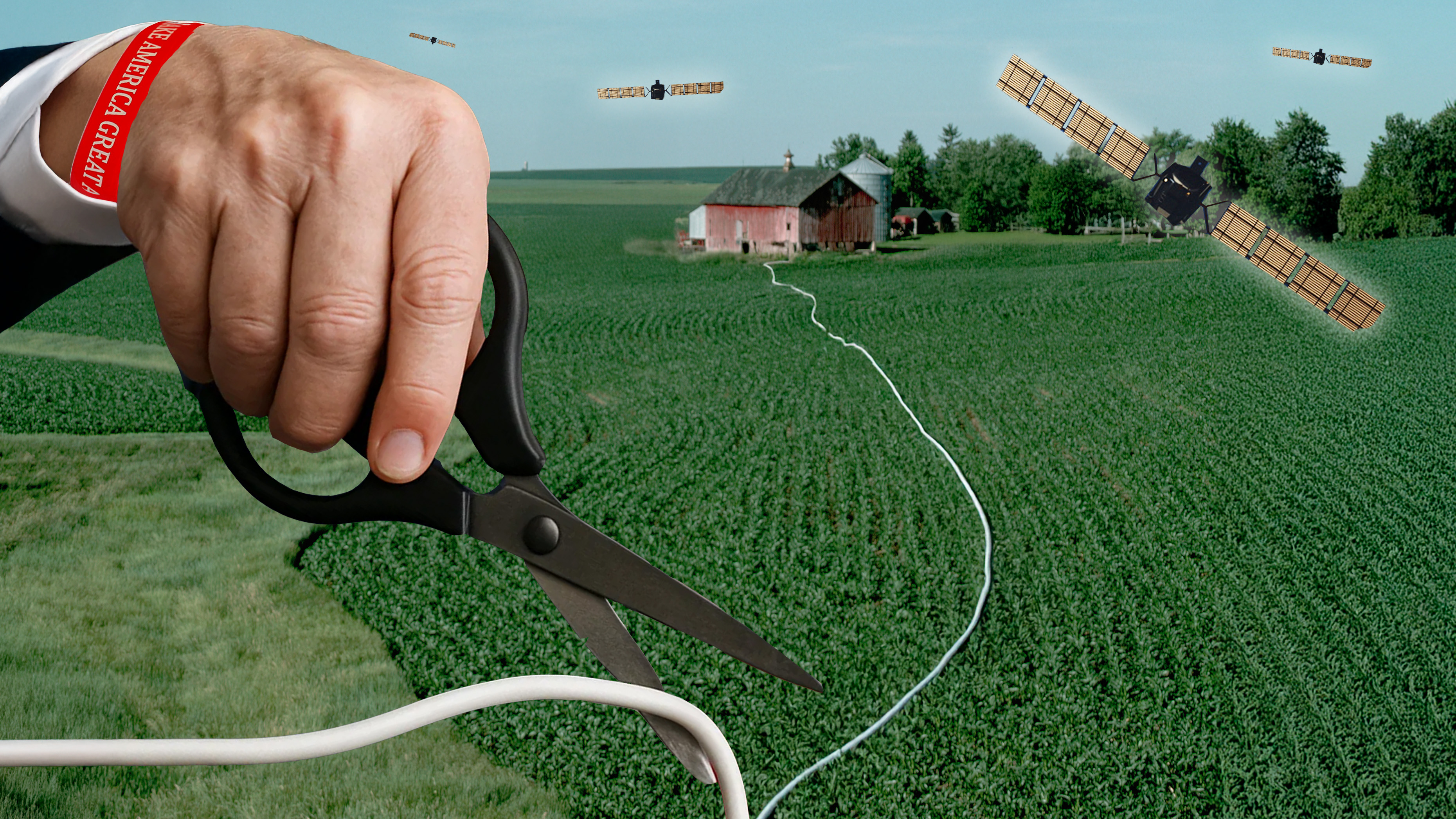Transcript: Cedric Richmond on "Face the Nation," November 7, 2021
The following is a transcript of an interview with White House senior adviser Cedric Richmond that aired Sunday, November 7, 2021, on "Face the Nation."
MARGARET BRENNAN: Our Mark Strassmann reporting from Atlanta. President Biden's $1.2 trillion dollar infrastructure bill is finally headed to the White House for his signature. It contains $110 billion for repairing roads and bridges across the country, as well as money for public transit and railway systems and for upgrading the nation's water systems. The bill includes funding to expand internet access and to pay for green energy projects like charging stations for electric cars. We turn now to senior adviser to the president, Cedric Richmond. He joins us from New Orleans. Good morning to you.
WHITE HOUSE SENIOR ADVISOR CEDRIC RICHMOND: Good morning, and thanks for having me.
MARGARET BRENNAN: The president said we could see shovels in the ground in two to three months. How certain are you you will have shovel-ready projects by the spring?
RICHMOND: We're very optimistic, almost certain. Remember, the president oversaw the American Rescue Plan, which we saw after the last Great Recession under the Obama administration that he oversaw, and it was very effective. He knows what he's doing. This is his plan. We have administration expertise to get it done, so I'm very confident we can get it done.
MARGARET BRENNAN: But this will only really work if you can fix some of the bottlenecks in the global supply chain to get the cement, to get all the workers hired here. I mean, we're seeing a record number of workers quitting their jobs. Companies are saying they can't even find laborers. So how do you deal with the fact that you have all these economic headwinds, including rising consumer prices? Do- can you unstick those?
RICHMOND: Well, you put a lot in there, let's start with the people leaving their jobs. People are leaving jobs, but they're leaving jobs for better jobs. They're not leaving the job market. They are getting better jobs under this Biden economy. And part of what the bipartisan infrastructure bill does is it will ease supply chain issues and it will also ease the inflationary pressures, which is why you see so many economists say that it's critical to do this so that we can bring costs down. And as I look at recovery in Louisiana, we have workers out there and we have people that are willing to work. And so we're not going to look at this from a standpoint of why we can't do it. We know that it's important to do. We know that we have the workers out there and we're going to start fixing this nation's crumbling infrastructure.
MARGARET BRENNAN: Well, the labor participation rate is still a problem. But your fellow Democrat, Virginia Congressman Abigail Spanberger warned this week that- that the president and his party aren't really being transparent about some of these economic issues. She said, "We're not willing to say inflation is a problem. The supply chain is a problem. We don't have enough workers in our workforce. We glossed over that and only like to admit to problems in spaces we dominate." Do you agree?
RICHMOND: Absolutely not, because I think we're dominating the economy. If you look at the fact that we have added more jobs this year than any president in the history of the United States. If you look at unemployment is 4.6%. The Congressional Budget Office projected getting down to 4.6% in 2023. We did it two years faster. We know that wages are rising. Unemployment is going down. We're creating somewhere around 620,000 jobs a month. And so I just don't agree with that premise whatsoever. And I think the president acknowledged that some prices are going up and we're going to- we're going to deal with that, which is why this bill was so critical and the Build Back Better bill. So I think the president and his economy is right on track. I think his three-pronged approach has always been correct. The rescue plan, the infrastructure plan and the human capital plan are all critical to continuing moving this economy in the right direction.
MARGARET BRENNAN: But as I mentioned, participation is a problem. Some people cannot go back to the workforce, and that brings us to that question of paid medical and maternity leave. The president said yesterday "time will tell" whether four weeks of paid leave ends up in this broader spending bill that you're talking about. Are you going to go to the mat this time to get senators to keep it in?
RICHMOND: Well, we put it in and I'd like to remind all of my--
MARGARET BRENNAN: And then you gave it up.
RICHMOND: I will remind all of my congressional friends that we put all of these things in both. This is the president's agenda and the president's commitment was--
MARGARET BRENNAN: But it wasn't in the framework that the president announced--
RICHMOND: The president's commitment was that he would put stuff in the framework that he thought had 50 votes in the Senate. And so community college didn't make it. He cares about community colleges. So what's more important is what's in the plan, what's not in the plan, and right now paid medical leave is in. And you talk about it in an economic framework. We view paid family and paid medical leave as a value proposition because we know what families go through in this country when children and family members get sick. The president knows it personally. I know it personally. The administration knows it personally. We are for paid medical and family leave, and that's why you see the president bringing so many senators down to the White House to make sure that it can stay in in the Senate. But right now, it does not have 50 votes in the Senate.
MARGARET BRENNAN: So it sounds like you're saying you will go to the mat for it this time? That you do want it in the final bill?
RICHMOND: We- no, what I'm saying is we've always gone to the mat for it.
MARGARET BRENNAN: I want to ask you about some things when you look at polling right now. Multiple polls have shown that support from key constituent groups for Democrats has receded a bit, particularly Black voters. The administration walked away from police reform. The John Lewis Voting Rights Act, as you know, was- failed this week. How long do Black voters have to wait for the president to deliver for them because this seems to be a problem in some of these races we saw this past week, particularly in a state like Virginia.
RICHMOND: MARGARET, and with all due respect, you're just wrong. I mean, let's- let's start here. Congress was unable to come to an agreement on police reform, so you know who acted? The president of the United States and the Department of Justice. They banned no-knock--
MARGARET BRENNAN: But Democrats walked away from those negotiations.
RICHMOND: Well, now are you talking Democrats, or are you talking about the president? So you ask about the president, let me finish. The president and DOJ banned chokeholds. The president and DOJ limited to restrictions of no-knock warrant. The president made sure that he is acting when Congress cannot. So if you look at voting rights, we doubled the size of the voting rights division in the Department of Justice so that we could challenge these unconstitutional laws in court. We are still pushing and we have Democrats united around a bill in Congress that has 50 votes that did not have 50 votes in the first instance. So the president is continuing to act where he can, and he's continuing to push Congress to act. And so, you know, when Congress cannot come together, the president has said--
MARGARET BRENNAN: Yeah.
RICHMOND: --that no action is not an option, which is why we're going to do another executive order on policing. We've talked to victims--
MARGARET BRENNAN: When?
RICHMOND: --We've talked to law enforcement. We've talked to civil rights advocates. We are going to continue to act. And since you brought up what have we done in the African-American community, reducing black poverty by 38% in one year--
MARGARET BRENNAN: Yes.
RICHMOND:-- is phenomenal. Reducing child poverty in one year by 50%, it's phenomenal. And so we are working and we're doing everything with equity in mind.
MARGARET BRENNAN: OK. Democratic strategist James Carville pointed this week to the loss of suburban voters in a state like Virginia, and he said, "What went wrong is the stupid wokeness." He argued Democrats are being defined by the progressives. You're not defining your own mess- message, particularly when it comes to issues like the economy. Aren't Republicans using that to their advantage?
RICHMOND: Well, the Republicans will use anything to their advantage, whether it's true or not. They're the party of misinformation. We see it with vaccines. We see it with everything and what they've been able to do is weaponize things and define it in their own way. The president has been very clear that his budget included $300 million more dollars for community policing because we know that every community wants to be safe, while he's talked about making sure that we have significant police reform. And so we're not defined by all of those things out there. But I think that the real issue is not exactly what James is saying. I think it's the fact that the Republicans will weaponize anything, fact or fiction.
MARGARET BRENNAN: In your home state of Louisiana, a federal appeals court just yesterday temporarily halted the nationwide implementation of the administration's decision to mandate testing or vaccination for private businesses. They cited "grave statutory and constitutional- constitutional issues." Are you confident you're on solid legal ground?
RICHMOND: Absolutely. We're- we're very confident we're on statutory and legal grounds. If you look at EEOC, if you look at DOJ, they both think we are. And remember, the purpose of the OSHA rule is to make sure that we keep employees safe in the workplace. 750,000 Americans have died due to COVID-19, almost 13,000 a day. And so when you go to work, you want to make sure that you're safe, and we see the vaccine mandates work. And that there's an option in there for weekly testing. But this is about keeping Americans safe, and, look, the job of being president is not doing the easy stuff. It's doing what's right. It's having the courage to follow through with it. And this president has done that time and time again. But the- the carnage that is out there, the families that are losing loved ones, it's at an unacceptable rate. Vaccinations is the best way to deal with it. And he has the courage to implement it.
MARGARET BRENNAN: Cedric Richmond, thank you for your time this morning. And FACE THE NATION--
RICHMOND: Thanks for having me.
MARGARET BRENNAN: --will be back in one minute with Virginia Democratic Senator Tim Kaine, so stay with us.



